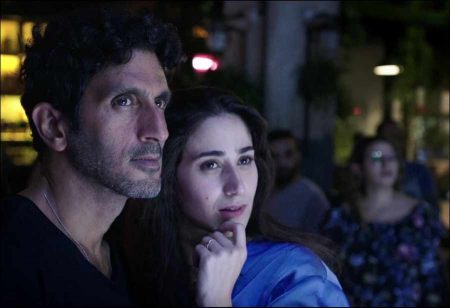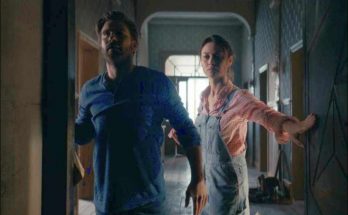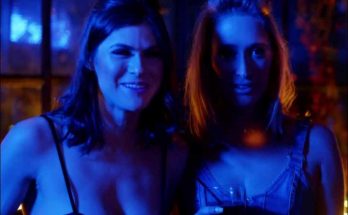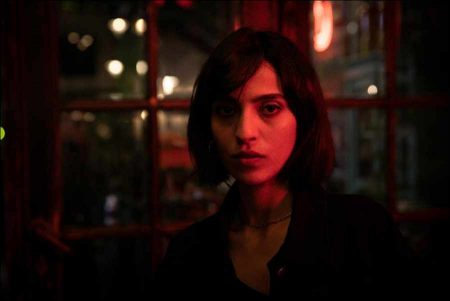
Taglines: Five women. Five stories. One night.
Laila in Haifa movie storyline. Haifa, in the present: Fattoush, a nightclub with an adjoining contemporary art gallery, is a refuge for a wide variety of people. Jews, Muslims, gays, heterosexuals and transvestites meet here, with a wide variety of views – from radical to moderate. Over the course of one night, the film follows five women whose stories intertwine. Gil meets the head of the art gallery, Laila, at the exhibition of a militant Israeli photographer. In the Fattoush, a multi-faceted microcosm unfolds that offers women a peaceful hiding place, protection from bullying and the arrogance of men.
Over the course of one night, we witness the interweaving stories of five women through a series of encounters and situations, defying all categories and labels in their relationships and personal identities. With an ensemble cast of both Israeli and Palestinian actors, Laila in Haifa is a drama with wry humor set over one night in a club in the port town of Haifa. The film presents a candid snapshot of contemporary life in one of the last remaining spaces where Israelis and Palestinians come together to engage in face-to-face relationships. The club itself is vital to the fabric of the film.
Amos Gitai delivers a sensitive and distinctly humanist reflection of life in the region. Laila in Haifa is a lieu de rencontres, a moment of dialogue, in a region that otherwise suffers from chronic violence and hatred. Posing the questions: how can the arts create a space in which people can express their different identities but are looking for ways of mutual and peaceful coexistence? How can the language of cinema using juxtaposition of fragments of stories create a common human tissue?
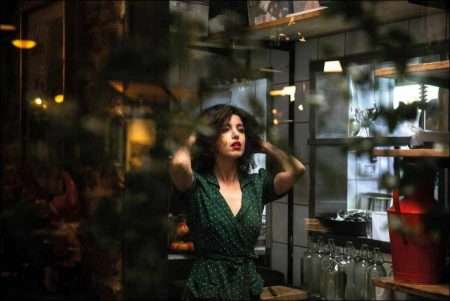
Film Review for Laila in Haifa
The whole of Amos Gitai’s “Laila in Haifa” is set in and just outside Fattoush, a bar in Israel that has been touted as “the best place to party in Haifa.” Maybe it is. One of the few venues in town where Israelis and Palestinians can socialize together, Fattoush boasts a knowledgeable barman, a small stage for musicians and drag queens, an adjoining art gallery, and plenty of such shabby-chic staples as bare brick walls, vintage posters and hanging plants.
If nothing else, the film may be useful to design historians as a record of what hipster-ish cafés and restaurants looked like in the early 21st century. It’s also a venue with no shortage of resonant thematic possibilities: trains trundle right past the beer garden, and beyond that a mountainous cruise ship is docked in Haifa’s harbor. But, as much as Fattoush has to recommend it, there is a distinct lack of party atmosphere on the evening chronicled in Gitai’s dreary ensemble drama. Cocktails are drunk, dances are danced, and new acquaintances pop outside to have sex in cars, but there is so little fun or vitality in the air that if this is the best place to party in town, the worst place must be appalling.
The most exciting part of the film is its first scene. A leather-jacketed Israeli, Gil (Tsahi Halevi), arrives at Fattoush for the opening of his photography exhibition about the hardships of Palestinian life, but he is immediately jumped by two men outside. After he has been beaten up and left in a puddle of rain, he is helped to his feet by the gallery’s publicist, Laila (Maria Zreik), and they go upstairs for a steamy clinch, presumably not concerned by the likelihood that someone else could walk in on them at any time.
This 10-minute sequence is all executed in one unbroken shot, thus raising the tantalizing prospect of a “Victoria”-style single-shot film. Alas, while the camera glides elegantly from scene to scene, there is nothing so adventurous or technically accomplished for the remaining 90 minutes, nor does anything as dramatic as the car-park assault happen again. Instead, various people turn up, have glum, portentous conversations about their lives, and then they drift off, slowly, to have glum, portentous conversations with someone else. It’s like the most depressing speed-dating night ever organized.
There’s nothing wrong with a series of talk-heavy vignettes, of course, but the performances and dialogue, by Gitai and Marie-Jose Sanselme, are chillingly reminiscent of an amateur fringe play in which the actors dress in black and stand on a black stage in front of a black curtain. It’s theatrical in the worst way. Laila’s much-older husband (Makram Khouri), who “owns half of Haifa,” squats at the bar to dispense advice. Gil’s stepsister (Naama Preis) bemoans the loveless state of her marriage. A chef and a waitress disagree over whether to have children; two gay men disagree over their relationship. Long pauses and daytime-soap frowns abound; charisma and engaging personalities do not.
Perhaps the stilted speeches sound better in Hebrew and Arabic, but in translation, they aren’t pretty. “The time of the great epochs has passed,” declares someone. “They say that love and hate are alike,” declaims someone else. “It’s 10 times more dangerous to let it happen than to make it happen,” explains someone further. “You get it?” Well, no — having one character recounting the dream they had last night may be regarded as unfortunate, but having two characters recounting their dreams is pushing it. And then there’s the line, “The political system today is like a bad play.” Glass houses, mate. Glass houses.
Speaking of politics, the topic of Israeli-Palestinian friction comes up every now and then, so you might predict an explosion or a shooting or some kind of climactic outrage which would resolve and lend some retroactive significance to the rest of the film. Spoiler alert: no such outrage occurs. The most striking development, as the evening drags to an end, is that music starts playing and some people dance, but even this is dispiritingly quiet and lethargic for the best party joint in town. The only rational explanation is that Fattoush’s owners begged the patrons not to prompt any noise complaints from the neighbors. Prospective viewers are advised to head to the nearest bar instead, where the company is bound to be more stimulating.
Laila in Haifa (2020)
Directed by: Amos Gitai
Starring: Maria Zreik, Clara Khoury, Naama Preis, Bahira Ablassi, Khawla Ibraheem, Tsahi Halevi, George Nasser, Andrzej Seweryn, Hisham Suleiman, Makram J. Khoury, Hanna Laslo, Ayman Safiyeh
Screenplay by: Marie-Jose Sanselme
Cinematography by: Éric Gautier
Film Editing by: Yuval Orr
Art Direction by: Ziv Koren, Arie Weiss
Makeup Department: Carmit Buzaglo, Revital Darom
Music by: Alexey Kochetkov
MPAA Rating: None.
Distributed by: Epicentre Films (France)
Release Date: September 8, 2020 (Venice Film Festival), September 1, 2021 (France), October 20, 2022 (Israel)
Views: 142
